1061 scholarly books by Catholic University of America Press and 123
1061 scholarly books by Catholic University of America Press
123 start with C start with C
123 start with C start with C
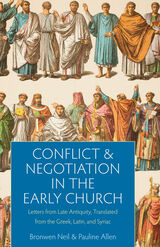
Conflict and Negotiation in the Early Church
Letters from Late Antiquity, Translated from the Greek, Latin, and Syriac
Bronwen Neil
Catholic University of America Press, 2020
Recent decades have seen great progress made in scholarship towards understanding the major civic role played by bishops of the eastern and western churches of Late Antiquity. Brownen Neil and Pauline Allen explore and evaluate one aspect of this civic role, the negotiation of religious conflict.
Conflict and Negotiation in the Early Church focuses on the period 500 to 700 CE, one of the least documented periods in the history of the church, but also one of the most formative, whose conflicts resonate still in contemporary Christian communities, especially in the Middle East.
To uncover the hidden history of this period and its theological controversies, Neil and Allen have tapped a little known written source, the letters that were exchanged by bishops, emperors and other civic leaders of the sixth and seventh centuries. This was an era of crisis for the Byzantine empire, at war first with Persia, and then with the Arab forces united under the new faith of Islam. Official letters were used by the churches of Rome and Constantinople to pursue and defend their claims to universal and local authority, a constant source of conflict. As well as the east-west struggle, Christological disagreements with the Syrian church demanded increasing attention from the episcopal and imperial rulers in Constantinople, even as Rome set itself adrift and looked to the West for new allies.
From this troubled period, 1500 letters survive in Greek, Latin, and Syriac. With translations of a number of these, many rendered into English for the first time, Conflict and Negotiation in the Early Church examines the ways in which diplomatic relations between churches were developed, and in some cases hindered or even permanently ruptured, through letter-exchange at the end of Late Antiquity.
Conflict and Negotiation in the Early Church focuses on the period 500 to 700 CE, one of the least documented periods in the history of the church, but also one of the most formative, whose conflicts resonate still in contemporary Christian communities, especially in the Middle East.
To uncover the hidden history of this period and its theological controversies, Neil and Allen have tapped a little known written source, the letters that were exchanged by bishops, emperors and other civic leaders of the sixth and seventh centuries. This was an era of crisis for the Byzantine empire, at war first with Persia, and then with the Arab forces united under the new faith of Islam. Official letters were used by the churches of Rome and Constantinople to pursue and defend their claims to universal and local authority, a constant source of conflict. As well as the east-west struggle, Christological disagreements with the Syrian church demanded increasing attention from the episcopal and imperial rulers in Constantinople, even as Rome set itself adrift and looked to the West for new allies.
From this troubled period, 1500 letters survive in Greek, Latin, and Syriac. With translations of a number of these, many rendered into English for the first time, Conflict and Negotiation in the Early Church examines the ways in which diplomatic relations between churches were developed, and in some cases hindered or even permanently ruptured, through letter-exchange at the end of Late Antiquity.
[more]
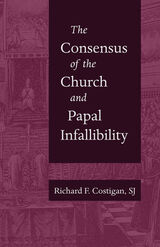
The Consensus of the Church and Papal Infallibility
A Study in the Background of Vatican I
Richard F. Costigan, S.J.
Catholic University of America Press, 2005
After a concise introduction that defines the two schools of theology, Richard Costigan examines the thought of nine major theologians on the subject: Bossuet, Tournely, Orsi, Ballerini, Bailly, Bergier, La Luzerne, Muzzarelli, and Perrone.
[more]

Constancy and the Ethics of Jane Austen's 'Mansfield Park'
Joyce Kerr Tarpley
Catholic University of America Press, 2010
Constancy and the Ethics of Jane Austen's Mansfield Park offers a rigorous philosophical examination of the novel, the first book-length, close reading to do so.
[more]
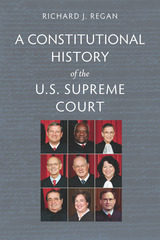
A Constitutional History of the U.S. Supreme Court
Richard Regan
Catholic University of America Press, 2015
The Supreme Courts decisions concerning the first amendment are hotly debated, and the controversy shows no signs of abating as additional cases come before the court. Adding much-needed historical and philosophical background to the discussion, Richard J. Regan reconsiders some of the most important Supreme Court cases regarding the establishment clause and the free exercise of religion.
[more]
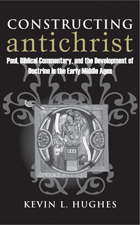
Constructing Antichrist
Paul, Biblical Commentary, and the Development of Doctrine in the Early Middle Ages
Kevin L. Hughes
Catholic University of America Press, 2005
Constructing Antichrist engages readers with the question: what does Paul have to do with the Antichrist? Integrating new scholarship in apocalypticism and the history of exegesis, this book is the first longitudinal study of the role of Paul in apocalyptic thought
[more]
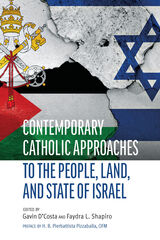
Contemporary Catholic Approaches to the People, State, and Land of Israel
Gavin D'Costa
Catholic University of America Press, 2021
After Vatican II, the Roman Catholic Church began a process of stripping away anti-Jewish sentiments within its theological culture. One question that has arisen and received very scant attention regards the theological significance of the founding of the state of Israel in 1948 – and the attendant nakba, the plight of the Palestinian people. Some American evangelical Christians have developed a theology around the state of Israel, associating themselves with Zionism. Some Christian groups have developed a theology around the suffering of the Palestinian people and demand resistance to Zionism.
This unique collection of essays from leading Catholic theologians from the United States, Germany, France, Italy, Switzerland, England, and the Middle East reflect on the theological status of the land of Israel. These essays represent an exhaustive range of views. None avoid the new Catholic theology regarding the Jewish people. Some contributors see this as leading towards a positive theological affirmation of the state of Israel, while distancing themselves from Christian Zionists. All contributors are committed to rights of the Palestinian people. Some affirm the need for strong diplomatic and political support for Israel along with equal support for Palestinians, arguing that this is as far as the Church can go. Others argue that the Church’s emerging theology represents the guilt conscience of Europe at the cost of the Palestinian people. None deny the right of Jews to live in the land.
Two Jewish scholars respond to the essays creating an atmosphere of genuine interfaith dialogue which serves Catholics to think further through these issues.
[more]

A Contemporary Introduction to Thomistic Metaphysics
Michael Gorman
Catholic University of America Press, 2023
A Contemporary Introduction to Thomistic Metaphysics provides the reader with an introductory presentation of key themes in Thomistic metaphysics. There are many such books, but this one is, to use a phrase Michael Gorman has adopted, “analytic-facing,” i.e., it presents things in dialogue with analytic philosophy. Sometimes that means disagreeing with analytic proposals (for example, possible worlds), and sometimes it means agreeing with them (for instance, making ample use of Ryle’s notion of “systematically misleading expressions”).
What’s more, it (gently) takes a somewhat deflationary attitude towards many things metaphysicians like to talk about, such as accidents, universals, and the like. By “deflationary” Gorman means that such items are taken seriously, but their ontological status is taken down a notch: features, universals, possible worlds, and other such things are understood in terms of what substances are and what substances are. Substances are ”basic beings,” and other things are what they are only in relation to substances. Of course this is Aristotle 101, but metaphysicians, Aristotelians included, often slip into treating non-substances as mini-substances, and Gorman pushes back against this throughout.
A Contemporary Introduction to Thomistic Metaphysics begins by explaining what philosophy is, what metaphysics is, and how these relate to other kinds of thinking. It then moves through a series of topics, ending with a brief look at applications of metaphysical thinking in theology.
[more]
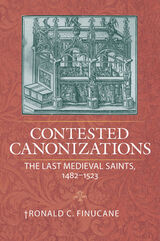
Contested Canonizations
The Last Medieval Saints, 1482-1523
Ronald C. Finucane
Catholic University of America Press, 2011
This work, which forms an important bridge between medieval and Counter-Reformation sanctity and canonization, provides a richly contextualized analysis of the ways in which the last five candidates for sainthood before the Reformation came to be canonized.
[more]
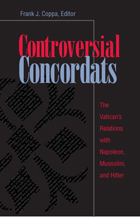
Controversial Concordats
The Vatican's Relations with Napoleon, Mussolini, and Hitler
Frank J. Coppa
Catholic University of America Press, 1999
Controversial Concordats offers an engaging survey of the relationship of the Roman Catholic Church with three dictatorial figures in the nineteenth and twentieth centuries: Napoleon, Mussolini, and Hitler.
[more]
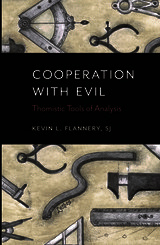
Cooperation with Evil
Thomistic Tools of Analysis
Kevin L. Flannery, SJ
Catholic University of America Press, 2019
Contemporary society very often asks of individuals and/or corporate entities that they perform actions connected in some way with the immoral actions of other individuals or entities. Typically, in the attempt to determine what would be unacceptable cooperation with such immoral actions, Christian scholars and authorities refer to the distinction, which appears in the writings of Alphonsus Liguori, between material and formal cooperation, the latter being connected in some way with the cooperator's intention in so acting. While expressing agreement with most of Alphonsus's determinations in these regards, Cooperation with Evil also argues that the philosophical background to these determinations often lacks coherence, especially when compared to related passages in the writings of Thomas Aquinas.
Having compared the philosophical approaches of these two great moralists, Cooperation with Evil then describes a number of ideas in Thomas's writings that might serve as more effective tools for the analysis of cases of possible immoral cooperation. The book also includes, as appendixes, translations of relevant passages in both Alphonsus and Thomas.
[more]
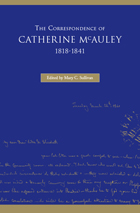
"The Correspondence of Catherine McAuley, 1818-1841"
Mary C. Sullivan
Catholic University of America Press, 2004
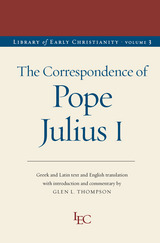
The Correspondence of Pope Julius I
Glen Thompson
Catholic University of America Press, 2015
Please fill in marketing copy
[more]
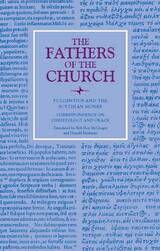
Correspondence on Christology and Grace
Rob Roy McGregor
Catholic University of America Press, 2013
Between the years AD 519 and 523, Fulgentius engaged in correspondence with a group of Latin-speaking monks from Scythia, and that correspondence is translated into English--almost all of it for the first time--in this volume.
[more]
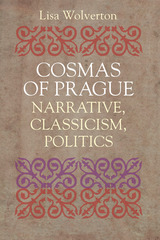
Cosmas of Prague
Lisa Wolverton
Catholic University of America Press, 2014
Please fill in marketing copy
[more]
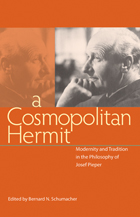
A cosmopolitan hermit
modernity and tradition in the philosophy of Josef Pieper
Bernard N Schumacher
Catholic University of America Press, 2009
Composed of ten original essays written with the goal of exploring the thought of one of the most significant German philosophers of the 20th century, namely, Josef Pieper (1904-1997), this book is the only systematic treatment of his expansive philosophy to date.
[more]
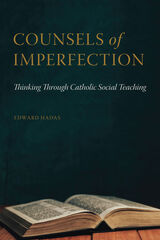
Counsels of Imperfection
Thinking Through Catholic Social Teaching
Edward Hadas
Catholic University of America Press, 2021
For more than a century, the teaching authority of the Catholic Church has attempted to walk along with the modern world, criticizing what is bad and praising what is good. Counsels of Imperfection described the current state of that fairly bumpy journey.
The book is divided into 11 chapters. First comes an introduction to ever-changing modernity and the unchanging Christian understanding of human nature and society. Then come two chapters on economics, including a careful delineation of the Catholic response, past and present, to socialism and capitalism. The next topic is government, with one chapter on Church and State, another on War, and a third that runs quickly through democracy, human rights, the welfare state, crimes and punishments (including the death penalty), anti-Semitism, and migration.
Counsels of Imperfection then dedicates two chapters on ecology, including an enthusiastic analysis of Francis’s “technocratic paradigm”. The last topic is the family teaching, which presents the social aspects of the Church’s sexual teaching. A brief concluding chapter looks at the teaching’s changing response to the modern world, and at the ambiguous Catholic appreciation of the modern idea of progress.
For each topic, Counsels of Imperfection provides biblical, historical and a broad philosophical background. Thomas Aquinas appears often, but so does G. W. F Hegel. The goal is not only to explain what the Church really says, but also how it got to its current position and who it is arguing with. In the spirit of a doctrine that is always in development, Counsels of Imperfection points out both strong-points and imperfections in the teaching.
The book should be of interest to specialists in Catholic Social Teaching, but its main audience is curious newcomers, especially people who do not want to be told that there are simple Catholic answers to the complicated problems of the modern world.
[more]
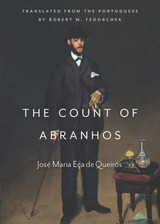
The Count of Abranhos
José Maria Eça de Queriós
Catholic University of America Press, 2020
José Maria Eça de Queirós (1845-1900) was a Portuguese author in the realist style, whose work has been translated into 20 languages. The Count of Abranhos was published posthumously, and this is the first time it has been translated into English.
Alípio Severo Abranhos, born to poor parents in a small town in the north of Portugal, goes off to spend his boyhood and adolescence with an aunt whose material well-being constitutes, for him, the lap of luxury. And he likes and becomes accustomed to luxury. As he follows a course of study for his bacharel at the University of Coimbra, certain negative character traits come to the fore, and upon completion of his degree he leaves behind a pregnant maid to take up residence in Lisbon. In the capital, he calculates—as a young man with neither position, nor fortune, nor social standing—how to get ahead in life. And the path is through marriage to a young woman of social status and promise of a sizable dowry, both of which can facilitate his rise in politics and government. Alípio’s weapons, his means, are various modes of hypocrisy—social hypocrisy, religious hypocrisy, filial hypocrisy, and political hypocrisy, with dishonesty, cowardice, and a farcical duel thrown in for good measure. Eça, like all accomplished novelists, does not tell us what Alípio becomes, rather he lets us see what he becomes, for with his unerring sense of satire, of character portrayal, and plot movement he lets the Count of Abranhos, with his steps and missteps, inform us himself of what he becomes. And with his actions, Alípio Severo Abranhos emerges as the personification, the very epitome, of the grim state of politics in nineteenth-century Portugal, a state engendered by the dogged pursuit of power. And through the obsequious eyes of Alípio’s biographer and the sycophantic hangers-on who wish to glory in his orbit, readers have a clear picture of the “great” man—a type who exhibits universal characteristics not confined to Eça de Queirós’s native country, nor to his time.
[more]
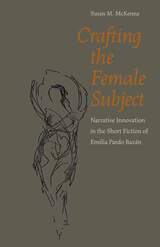
Crafting the Female Subject
Narrative Innovation in the Short Fiction of Emilia Pardo Bazán
Susan M. McKenna
Catholic University of America Press, 2009
Susan McKenna presents the innovative narratives of Emilia Pardo Bazán, Spain's preeminent nineteenth-century female writer, in Crafting the Female Subject.
[more]
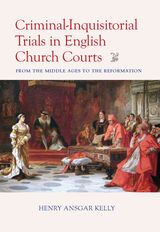
Criminal-Inquisitorial Trials in English Church Trials
From the Middle Ages to the Reformation
Henry Ansgar Kelly
Catholic University of America Press, 2023
After inquisitorial procedure was introduced at the Fourth Lateran Council in Rome in 1215 (the same year as England’s first Magna Carta), virtually all court trials initiated by bishops and their subordinates were inquisitions. That meant that accusers were no longer needed. Rather, the judges themselves leveled charges against persons when they were publicly suspected of specific offenses—like fornication, or witchcraft, or simony. Secret crimes were off limits, including sins of thought (like holding a heretical belief). Defendants were allowed full defenses if they denied charges. These canonical rules were systematically violated by heresy inquisitors in France and elsewhere, especially by forcing self-incrimination. But in England, due process was generally honored and the rights of defendants preserved, though with notable exceptions.
In this book, Henry Ansgar Kelly, a noted forensic historian, describes the reception and application of inquisition in England from the thirteenth century onwards and analyzes all levels of trial proceedings, both minor and major, from accusations of sexual offenses and cheating on tithes to matters of religious dissent. He covers the trials of the Knights Templar early in the fourteenth century and the prosecutions of followers of John Wyclif at the end of the century. He details how the alleged crimes of “criminous clerics” were handled, and demonstrates that the judicial actions concerning Henry VIII’s marriages were inquisitions in which the king himself and his queens were defendants. Trials of Alice Kyteler, Margery Kempe, Eleanor Cobham, and Anne Askew are explained, as are the unjust trials condemning Bishop Reginald Pecock of error and heresy (1457-59) and Richard Hunne for defending English Bibles (1514). He deals with the trials of Lutheran dissidents at the time of Thomas More’s chancellorship, and trials of bishops under Edward VI and Queen Mary, including those against Stephen Gardiner and Thomas Cranmer. Under Queen Elizabeth, Kelly shows, there was a return to the letter of papal canon law (which was not true of the papal curia). In his conclusion he responds to the strictures of Sir John Baker against inquisitorial procedure, and argues that it compares favorably to the common-law trial by jury.
[more]
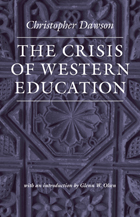
The Crisis of Western Education (The Works of Christopher Dawson)
Christopher Dawson
Catholic University of America Press, 2010
The Crisis of Western Education, originally published in 1961, served as a capstone of Christopher Dawson's thought on the Western educational system.
[more]
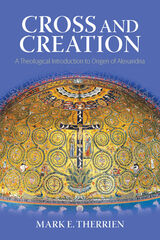
Cross and Creation
A Theological Introduction to Origen of Alexandria
Mark E. Therrien
Catholic University of America Press, 2022
Even though the theology of Origen of Alexandria has shaped the Christian Tradition in almost every way, the controversies over his legacy have been seemingly endless. One major interpretative trend, for example, has suggested Origen’s theology is really akin to the heterodox Gnostics against whom he wrote than the actual teaching of the Gospel, since he (supposedly) had a disdainful attitude towards Creation and ultimately saw little redemptive meaning in the Passion.
In Cross and Creation: A Theological Introduction to Origen of Alexandria, Mark Therrien offers an original interpretation of Origen’s theology. Focusing on some of Origen’s most important works (especially On First Principles and the Commentary on John, but ultimately making reference to his writings more broadly), this book retrieves and examines some of the foundational pillars of Origen’s theology through close readings and re-examinations of those texts. It examines eight of these theological foundations: God, Christ, the Holy Spirit, the end, the soul, the world, the cross, and deification. Moreover, by showing the connections between Origen’s understanding of these foundational pillars, it also shows the coherence of his theology as a whole. Taken collectively, what emerges from these eight chapters is that two doctrines specially shape Origen’s theology: Cross and Creation. As Therrien shows, Origen did not hold contempt for Creation. Rather, Origen thinks that Creation emerges from the very life of God as eternally foreknown and provided for in the person of Christ, the Wisdom of God the Father. Moreover, he also holds that, though fallen, Creation will be restored according to its original, eternal intention in God precisely through the Passion of Jesus Christ on the Cross. The Cross is thus not minimalized in Origen’s theology; it is rather its very center.
[more]
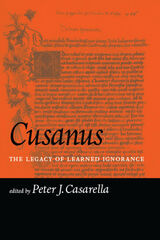
Cusanus
A Legacy of Learned Ignorance
Peter J. Casarella
Catholic University of America Press, 2006
This volume offers a detailed historical background to Cusanus's thinking while also assaying his significance for the present. It brings together major contributions from the English-speaking world as well as voices from Europe.
[more]

Cusanus Today
Thinking with Nicholas of Cusa Between Philosophy and Theology
David C. Albertson
Catholic University of America Press, 2024
At the end of the nineteenth century, German theologians and philosophers rediscovered the Renaissance cardinal Nicholas of Cusa (1401-1464). Immediately they hailed Cusanus as the first modern thinker, a brilliant German rival to the French Descartes. But since the founding of the Cusanus critical edition in 1927 up to its conclusion in 2005, historians have gradually learned that Nicholas was more of a medieval preacher and contemplative than a modern philosopher.
Yet over the same century, modern German and French readers were already digging into Nicholas’s many works. There they encountered an exciting voice with fresh perspectives about God’s immanence in the cosmos and the awesome capacities of the human mind. Leading philosophers and theologians from Erich Przywara to Karl Jaspers to Hans-Georg Gadamer, and from Gilles Deleuze to Jacques Lacan to Michel de Certeau, found their own thinking stimulated by the cardinal’s innovative concepts and interdisciplinary style. Even as Nicholas shifted from modern to medieval among historians, he was emerging as a contemporary interlocutor for moderns and postmoderns. Who could have guessed that the first debate between Jean-Luc Marion and Emmanuel Falque would take place over the fifteenth-century mystical dialogue, De
visione dei?
If Meister Eckhart found his moment amidst Deconstruction in prior decades, Nicholas of Cusa is our thinker for today. His interests anticipate themes in continental philosophy of religion, whether alterity, invisibility, the fold, or the icon. His habit of interweaving philosophy and theology anticipates current debates on the thresholds of phenomenology. Our volume first maps the contours of modern receptions of Nicholas of Cusa in French and German spheres, and then beyond Europe to the Americas and Japan. It also hosts the next round of engagement by some of today’s most original Christian thinkers: Emmanuel Falque, John Milbank, and David Bentley Hart.
[more]
READERS
Browse our collection.
PUBLISHERS
See BiblioVault's publisher services.
STUDENT SERVICES
Files for college accessibility offices.
UChicago Accessibility Resources
home | accessibility | search | about | contact us
BiblioVault ® 2001 - 2024
The University of Chicago Press









